Communiqué #2: A War for the Beating Heart of the Ummah
Islam of the 'Below' vs. Islam of the 'Above'

﷽
Bismi Allāh Al-Raḥmān Al-Raḥīm (In the name of Allah the Most Gracious, the Most Merciful).
“We say to two billion of our Muslim brothers that your people and brothers in religion in Palestine have purified their fast by offering a torrent of pure blood for the sake of Allah Almighty and for the sake of the path of your prophet and your Al-Aqsa which has been defiled by the most ruthless enemies of Allah. So, purify your fast by supporting it and fighting for its liberation.
By God, The Muslim Ummah will not rise up and it will not have any status amongst other Ummahs until this holy land is cleansed of the filth of the occupying usurpers. God will surely support those who support him. Indeed, God is powerful and exalted in might. We also remind the 2 billion Muslim Ummah, that we as an Arab Muslim People, have been rising for more than 70 years, and are defending the dignity of the Ummah in the face of the criminal Zionists. This people is being subjected, before your very eyes, to genocide and starvation, and attempts at displacement and liquidation, so what will you say to your God, and what will you do to defend your dignity, before the hand of the oppressors reaches you in your own home, God forbid.”
- Abu Obeida, Al-Qassam Brigades spokesperson, March 6th, 2025/6th of Ramadan 1446
The End Times War Against Taghūt (Tyranny)
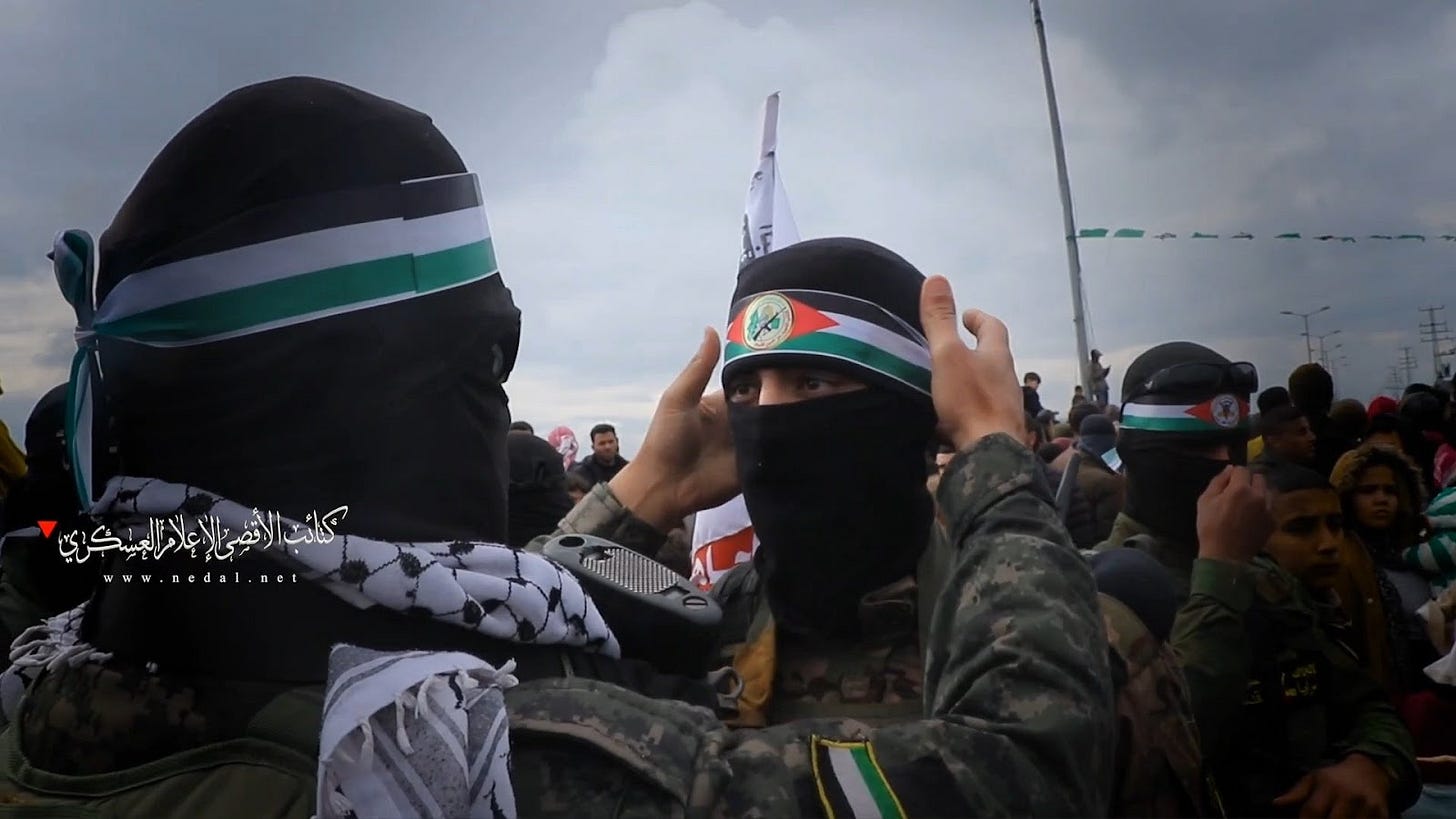
Our mujahideen are not secularists. They are political in a religious way.
This isn’t just an anti-colonial movement for national liberation, but rather a war cry waged in the name of the Qurānic and the Muslim concept of the Ummah.
The mujahideen are singing an elegy of complaint at the state of the Ummah’s condition. They trumpet a final wail aimed at the Ummah’s cleansing from all internal and external manifestations of taghūt (tyranny). The Ummah is often translated to mean the global community of Muslims, but the Qurān arguably defines the Ummah in an expanded way, as a global community of believers, including Muslims and non-Muslims alike who are anchored in principles of justice and freedom from tyranny.
As the Qur’an states, “Those who believe, fight in the cause of Allah, and those who disbelieve, fight in the cause of taghūt. So fight you against the friends of Shaitān (Satan); Ever feeble indeed is the plot of Shaitan” (Chapter 4, “The Women,” Verse: 9).
In Islām, taghūt - representing humanity’s downfall - is a product of Shaitān, and Satan is not an abstract figure. Shaitān and his progeny are embodied in capitalist and nation-state structures that blatantly contradict and are antithetical to Islāmic ethical-political, and spiritual principles of justice. Additionally, Shaitān manifests in the form of the little fascisms (the little Mussolinis, the mini-Trumps, Obamas and Bernies) that exist inside each and every one of us based on our weaning on these structures imposed by Euro-American crusading colonialism and imperialism.
Allah enjoins every Muslim to wage al-Jihād al-akbar (the greater struggle) against the taghūt within our hearts and minds that materialize through our actions. The Qurān states: “God does not change the condition of a people unless they change what is in themselves" (Chapter 13, “The Thunder,” Verse: 11). Upon returning from a battle the Prophet Muhammad (peace be upon him) told his companions:
“We return from the lesser Jihād to the greater Jihād.” The greater Jihād is challenging because it entails individual and collective struggle against our authoritarian egos, individualist selfishness, greed, and evil that nation-states and capitalism embolden.
In Islām, devotion to capital and the nation-state is taghūt. In the Qurān, kings who imprisoned Prophets engaged in taghūt. Taghūt is a state of mind, a way of thinking, a way of being and walking dominantly on the land as opposed to living in symbiotic relation with it.
Taghūt bears amoral, unethical values and is personified in modern global governing and economic structures and institutions like NGOs and Euro-American international laws.
Taghūt thrives through false Eurocentric concepts like ‘democracy’ and ‘civilization,’ whose hypocrisy has been nakedly exposed in this prophesied apocalyptic end times racial-religious war.
The mujahideen’s Qurān of the Resistance affirms this when Allah states: “And verily, We have sent among every Ummah [community] a Messenger [proclaiming]: ‘Worship Allah (alone), and avoid taghūt. So travel through the land and see what was the end of those who denied (the truth)’.” (Chapter 16, “The Bees,” Verse: 36). Taghūt resides inside every one of us when we remain silent in the face of inconceivable, unutterable, evil and reproduce it when we refuse to speak and act against injustice. Islām’s medicine and antidote is al-Jihād al-akbar, the inner struggle against our own ungodliness. Al-Jihād al-akbar is the endless war we wage against the internal taghūt within each and every one of us that strives and covets wealth, power, and all earthly ornaments.
Our worship of material wealth, and even the excessive obsessional attachment of a parent to their newborn infant, is an alleyway to taghūt. The Qurān states, “Wealth and children are the adornment of this worldly life, but the everlasting good deeds are far better with your God in reward and in hope” (Chapter 18, “The Cave,” Verse: 46) While the Qurān acknowledges wealth and children as a blessing that requisites immense responsibility, Allah also cautions that believers shouldn’t be consumed by them, so as to neglect the true meaning of life. The muqawama (resistance) are a living embodiment of this ethos.
Building Beyond Capitalism and the Nation-State
There is no concept of the nation-State in Islām. Muslims and Arabs often mistranslate and misinterpret the Qurānic concept “Dawla” to correspond to the modern state. However, Dawla extends from the root D-W-L, which when used in the Qurān actually signifies and means to turn, alternate, or come around in a cyclical fashion. Dawla revolves around notions of dynamic change and rotation, rather than a fixed order and geography associated with nation-states. In Islām, venerating the modern nation-State is taghūt because all sovereignty in Islām lies with Allah: Allah’s sovereignty in earthly form manifests in the bountiful, collective, and borderless concept of the Ummah.
Taghūt nurtures, according to the Qurān, an unscrupulous condition in which our hearts become blind. It is this detestation of taghūt that drives the armed Palestinian Islāmic Jihād (PIJ) and Al-Qassam Brigades to be more critical of capitalism and want no part in seeking or exercising political power, in comparison to Hamas’ political wing, out of fear of becoming intoxicated by it. So-called “political-Islām” and our mujahideen are not a monolith, their formations vary along a spectrum depending on their theological interpretations of the Qurān.
The PIJ and the Al-Qassam Brigades represent an ‘Islām of the Below,’ aimed at serving the poor, women, the elderly, children, and a horizontalist understanding of justice.
While Hamas’ political wing, at least prior to Al-Aqsa Flood, pursued an ‘Islām of the Above’ that aspired to assimilate into a vertical international liberal world order – an order whose innate fraudulence has been even more starkly unmasked since October 7th, 2023. Both these below and above forms of ‘political-Islām’ ultimately concede that we are susceptible to engaging in shirk (idolatry) - a passageway to taghūt - when we pledge allegiance and worship anything besides Allah.
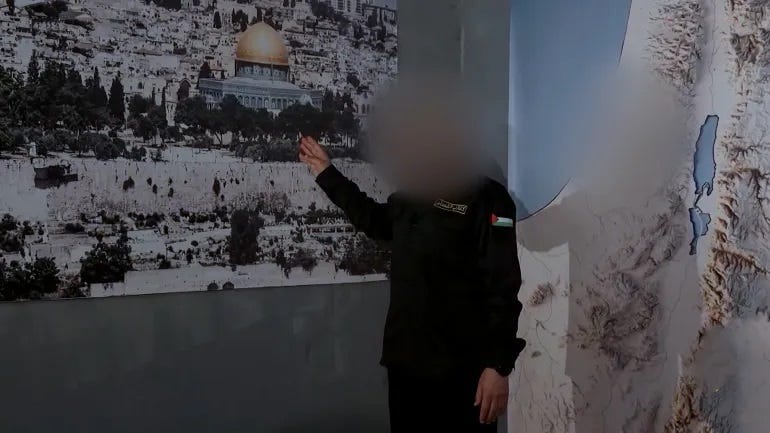
By referring to taghūt, Commander Al-Deif and our mujahideeen are keen to remind us to be vigilant in combating Shaitān, his every offspring, and all their foul works. The devil’s children shapeshift and take on innumerable forms. For instance, Shaitān reverberates in the treachery of Arab and Muslim governments and peoples alike in relation to their long abandonment of Palestine, as per the example of Egypt, the second jailer of Gazans since the Camp David peace accords of 1978.
The Egyptian people during the apex of the Orientalized ‘Arab Spring’ and the Tahrir Uprisings in 2011 carried Palestinian flags and in their millions called for the overthrow of the taghūt Pharaoh Mohamed Hosni Mubarak. Some Egyptians even demanded the dissolution of the 1978 peace accords, yet there was no strategic organized ethical-political and spiritual project that could enable and actualize Egyptian support of Palestine’s liberation.
Since the Sykes-Picot Agreement - or the British-French treaty with assent from Russia and Italy - that divided the Ottoman Empire and consequently partitioned predominantly Arab and Muslim lands and territory - Egyptians (and more generally Arabs and Muslims) have had to make a choice.
The decision for Arabs and Muslims is between two competing sets of loyalties: The first being to each colonially imposed individual ethno-nationalist state (Egypt, Jordan, Lebanon, Libya, Morocco, Tunis, Syria, Arabian Peninsula nations, etc) and the second being the non-statist concept of Ummah.
Geographically speaking and prior to the colonial imposition of state borders, Gaza was traditionally a part of Rafah and the gateway to North Africa, whereas the remainder of Palestine was the doorway to the Levant.
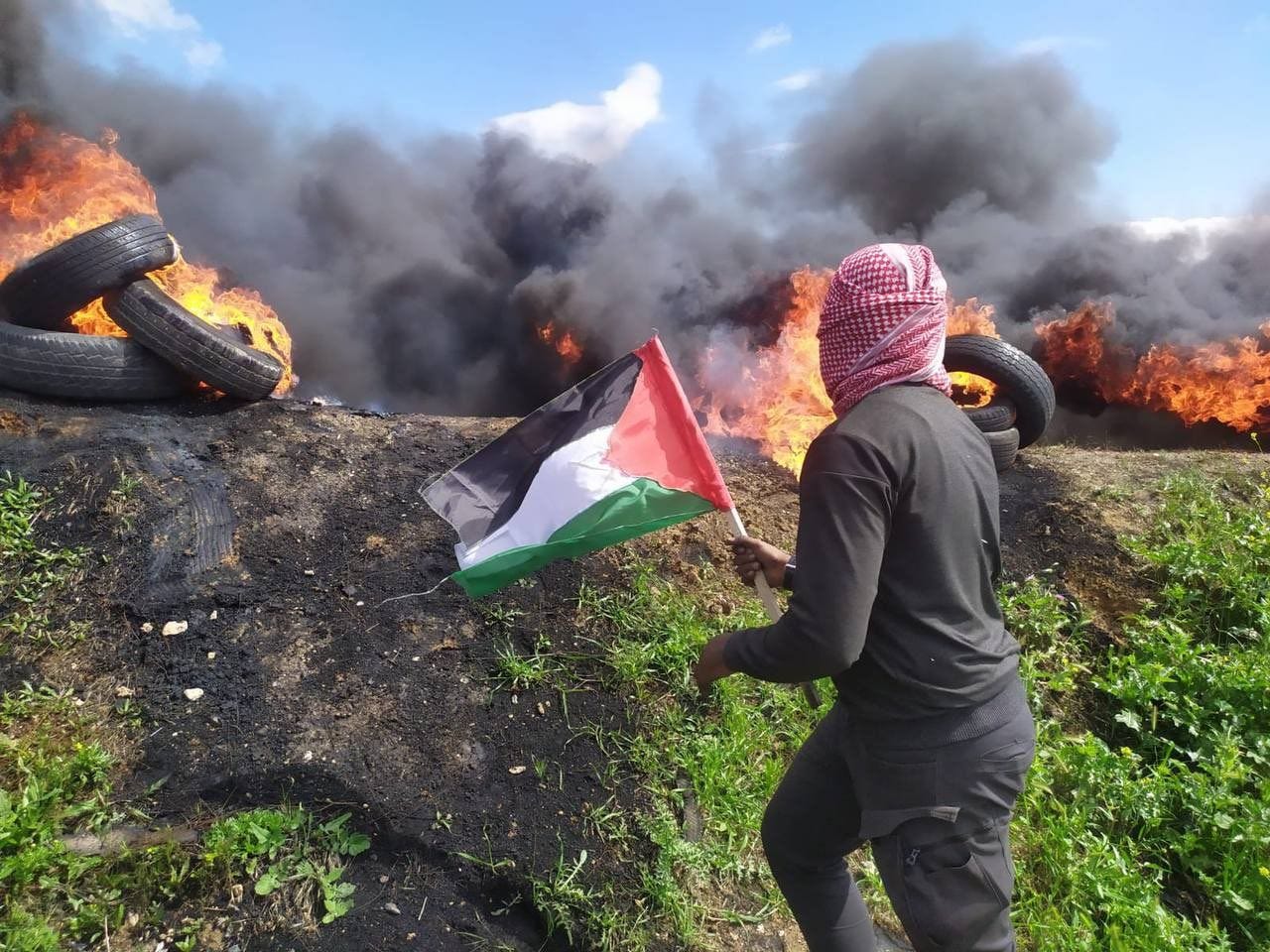
During the uprisings, Egyptians naively and self-deceivingly claimed to overcome fear without a more expansive liberatory trajectory that centered the Ummah in hand. The majority of Egyptians have long rejected normalization with the Zionist entity and while they feel a loyal affection towards Palestine, the spark of internal and social metamorphosis required to achieve the Ummah remains amiss. The fall of Mubarak and the vacuum he left behind only served to embolden Egyptian political and religious factionalism and taghūt, with each political party (including those leftist) looking after its own demagogic interests.
After all, revolutions involve practical questions: How will we eat, breathe, & transform ourselves as individuals & collectives differently? How will we organize ourselves and our socio-economic, political and spiritual relations more justly than they were prior?
"Dismantling," vying for progressive reform, or even the revolutionary seizure of postcolonial state institutions not only problematically assumes that the modern nation-state is a neutral instrument that can be utilized for social change, it obscures the need to divest fully from these structures and construct decolonial alternatives on the land.
Egyptians, like many movements and peoples, assumed that state-reform or its take-over towards a revolutionary end was possible. By and large Egyptians did not birth alternatives like for example the Black Panthers who organized "Free Breakfast for Children Programs" beyond the state. The Panthers built services - “survival programs” - providing food, clothing, transportation, community health clinics, and education initiatives. The Zapatistas similarly created a distinct horizontalist world for 10 years 'underground' in the Lacandon Jungle before announcing themselves on the scene and declaring themselves at war with the Mexican state. Orchestrating operation Al-Aqsa Flood required many years of silent, scrupulous, covert building and planning.
By contrast, even if they do not rhetorically support normalization with the Zionist entity, Egyptians by and large give in to the self-conceited idea that they ‘lack agency.’ Egyptians, as many others around the world, suffer the malaise of an internalized fascism, under a totalitarian government. Unwilling to sacrifice more than what is comfortable, Egyptians in one way or another are resigned to becoming complicit accomplices and feeble lynchpin conscripts to the Abraham Accord’s structures, logics, and all that animates it. This self-castration is cancerous, and blatantly contradicts the Prophet Muhammad’s teachings that emphasize: “When you see evil, change it by your hand, if you cannot, then by your speech, and you cannot, then hate it in your heart, and this is the weakest of faith.”
An Expanded Ummah in a Racial-Religious War
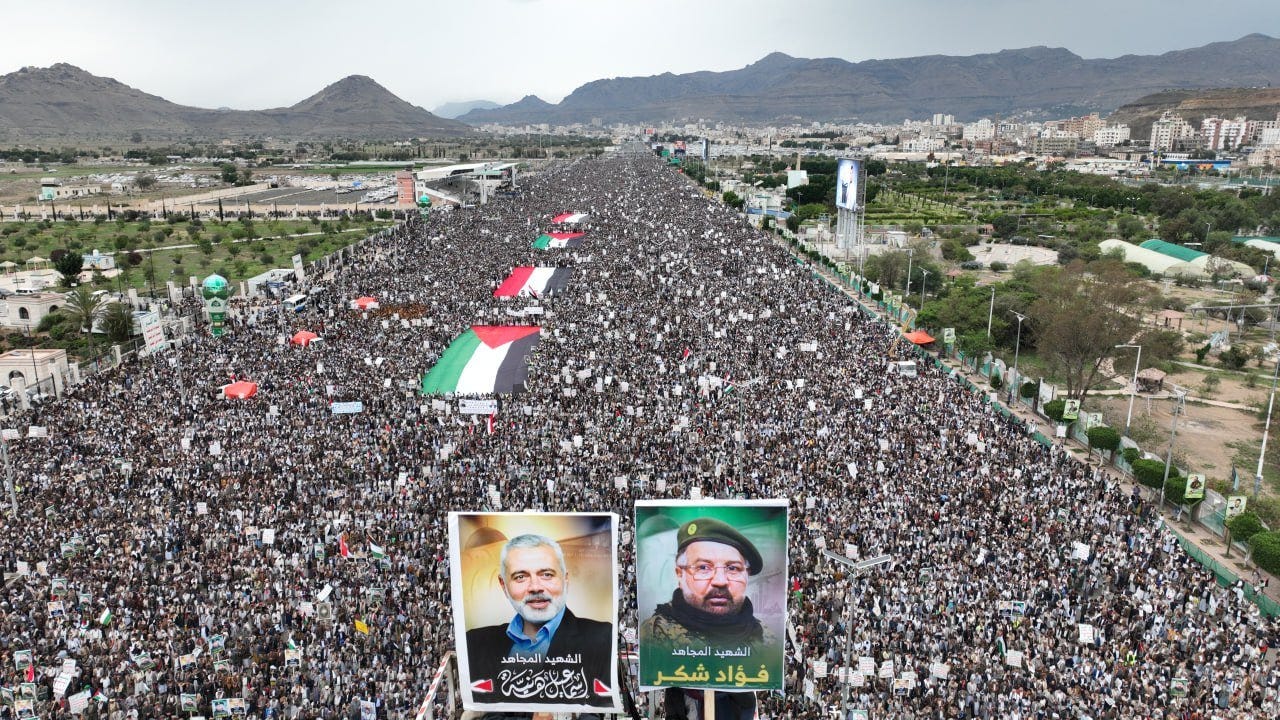
As embodied in the Medina Charter (Mīthāq al-Madīnah) the Prophet Muhammad (peace be upon him) founded an Ummah of both Muslim and non-Muslim believers all bound by shared spiritual, ethical-political commitments founded on social justice.
The Medina Charter advocated mutual aid, cohabitation, co-mingling, and the freedom of all to exercise rights to property, rituals (ʿibādāt), laws, and beliefs under the collective protection and sovereignty of a single Creator. The Charter emphasized that non-Muslim believers (mūmineen), and in this particular instant numerous Jewish tribes amongst which included the Jews of Bani ʿawf, Bani’ al-ʿAws, Bani ʿAmr, Bani’ al-Nabeet, Bani’ Harith, Bani’ Saeeda, and Bani al-Najjar are a single Ummah of believers.
The Medina Charter and original Ummah also included Christians, Sabians, Zoroastrians and even polytheists, all bound by shared spiritual, ethical, and political commitments, transcending identity reductionism. It was a unified non-territorial Ummah of believers from different faiths and spiritualities that disrupted any sense of totalitarian homogeneous Muslim, Christian, Jewish, or any other spiritual identity or character. It is irrelevant from a Qurānic perspective whether or not individuals and communities explicitly identify as Muslim or not. Analogously, the Qurān unequivocally asserts that a non-Muslim could very well embody ethical-political Muslim values and characteristics, even if they do not subscribe to Islām.
Euro-American leftists misdiagnose reality and lead our movements astray by continuing to dismiss the innate spiritual moorings of this existential holy battle for the world’s soul.
Leftists dismiss that capitalism is a religion and that the very architecture of the nation-state is inherently religious and specifically Christian in nature. Leftists need to reflect more introspectively on the sacred concept of spirituality as opposed to their misconceptions based on their own myopic experiences with Euro-American Christianity and orthodox interpretations of religion more generally. After all, every idea is political and endowed with a spirit that draws followers to believe in it as an idea that they are willing to die for.
Without spirituality how can one connect with our mother earth who is a spiritual subject, not an anthropomorphic object? Does the land not offer us the air we breathe, the food we eat? As Indigenous peoples and struggles on Turtle Island have long emphasized: How are we to connect with land without spirit? How can one love or sacrifice without spirit?

Religion as it is conceived, practiced, and deployed by colonial Euro-America is fundamentally different than for colonized people of the global majority.
As Pan-Africanist revolutionary Kwame Ture (Stokley Carmichael) long noted: “Our people who have never seen religion as the opium of the masses. That of course comes directly out of European culture...[for us] religion and revolution go hand in hand...If one is truly religious, one must be revolutionary!”
Abu Obeida’s opening quote in this communiqué makes clear that the mujahideen’s struggle is not simply for nationalist liberation, but rather a faith-based battle for the bleeding heart of a fragmented, sectarianized, and racialized Ummah whose pulse, compass, and mooring is Palestine and Al-Aqsa. Every Muslim from nascency is breastfed and weaned on a spiritual longing and thirst for the Ummah. Abu Obeida and the mujahideen are speaking to an Ummah’s past yore, whose consciousness they seek to reignite.
Our mujahideen are waging war against Crusading and Zionist taghūt in the name of restoring honor and dignity to an Ummah beyond lavish convened conferences in cordoned dining halls: An Ummah that in the contemporary has become a vacuous, flailing, body. The mujahideen and every Muslim knows full well that the Prophet (peace be upon him) said: “The Ummah resembles one body, so that, if any part of the body is not well then the whole body shares the sleeplessness (insomnia) and fever with it."
The End Times War (Where All Wars Fit)
Desecration of Al-Aqsa Mosque, a red line as to why Operation Al-Aqsa Flood was launched, is a penultimate symbol of Palestine’s health and is emblematic of the Ummah’s well-being.
Zionists at every opportunity, including holidays like Passover, desecrate Al-Aqsa Mosque and the Dome of the Rock’s sacred sanctuary with their filthy intrusions. Recently, extremist Israeli platforms published an AI-generated video depicting the destruction of Al-Aqsa Mosque and calling for its replacement with the Third Temple, adding the words: “Coming soon in these days.”
While Zionists are busy discussing and preparing to blow up Al-Aqsa and the Dome of the Rock, Muslim scholars and peoples are preoccupied with pedantic debates over the hijab and inheritance laws. The End Times War (where all wars fit) is upon our doorsteps.
In response to these ongoing blatant acts of vile aggression, the Jordanian government - that represents an ‘Islām of the Above’ and is amongst the first normalizing regimes since the 1994 Wadi Araba peace treaty with the Zionist entity - has constrained its limp “outcry” to superficial condemnation of Zionist trespassing.
It is worth noting that the Jordanian government bears particular complicity because it possesses custodianship, control, and is responsible for the management of Al-Aqsa, through what is referred to as Al-Waqf administrative authority, and yet it has done nothing.
While the Jordanian people (whose population is significantly of Palestinian descent) have engaged in street mobilizations despite the sell-out government’s crackdowns, their condition is like that of the Egyptian people described above: There is no political and spiritual project or an Islām of the Below that takes the muqawama as its inspiration.
The Qurān emphasizes the significance of duʿā (supplication) for all who are oppressed, and Muslims polemically engage in these duʿās every Friday prayer following the broadcasted delivery of state-scripted and sanctioned sermons. Shamefully, Muslims have grown increasingly over-reliant on supplications as a justification for their inert inaction, replacing the addressing of unjust systemic structures with individualist framings of salvation. The Qurān states:
"Believers who sit at home - except those with valid excuses - aren't equal to those who strive in the cause of Allah with their wealth & their lives. Allah has elevated in rank those who strive with their wealth & their lives above those who stay behind [with valid excuses]. Allah has promised each a fine reward, but those who strive will receive a far better reward than others."
(Chapter 4, “The Women,” Verses: 95-96)
Irrespective of how much Muslims engage in ritualistic worship and supplication, they can never compare themselves to our mujahideen who forge weapons with their own hands, while predominantly Muslim nations buy them from the U.S., France, the UK, Russian, and Chinese military industrial complexes and manufacturers. As Prophet Muhammed stated, “Beware the supplication of oppressed as there is no barrier between it and Allah” and this is affirmed in the Qurānic verse: “Your God says, ‘Call upon Me; I will respond to you.” (Chapter 40, “The Forgiver,” Verse: 60). Still, Allah also calls for firm concrete action.
Why won’t Muslims march by the millions and break the Crusading-Zionist siege on Palestine from all sides? Will these despotic regimes that represent an ‘Islām of the Above’ murder one, two, three, ten million of their citizens? If they criminally did so, at least dignified Muslims attempting to break the suffocating blockade on Palestine would die on their feet as opposed to living cowardly on their knees.
Islām of the Above, Islām of the Below
Vastly distinct from the cases of individual and collective Muslim impotence described above, movements such as Ansar Allah represent an ‘Islām of the Below’ and are unflinchingly committed to fulfilling their religious, moral, and humanitarian duty towards Palestine against Crusading-Zionist aggression. It is also in solidarity with the Palestinian mujahideen that Hezbollah under the leadership of martyr Hassan Nasrallah opened the southern front against the Zionist entity on October 8th, 2023.
It is worth noting that while Hezbollah began as an anti-colonial movement embodying an ‘Islām of the Below,’ over time and particularly following its increasing gradual investment in its Lebanese parliamentary political party (Amal) it became more beholden to a state-centered ‘Islām of the Above.’ This has become even more accurate and discernible after Nasrallah’s assassination. By a similar logic, and far from its 1979 revolutionary impulse, the current form of the Iranian nation-state represents an ‘Islām of the Above.’
The Ummah has been in constant decline since the ushering of its collapse with the Ottoman Empire in 1798. Our mujahideen understand fully well that the mere utterance of shahāda (the Muslim proclamation of faith) is a divine mission that makes it incumbent upon all Muslims to become not only witnesses but also authors of our collective destiny. The shahāda is the covenant and decree that defines the Ummah’s purpose to be fulfilled. The Ummah manifests in whatever way Muslims conceive of it. If Muslims aren’t prioritizing the Ummah, it will be rendered as a desolate barren desert. If they envision it through the prism of the colonizer’s world, then it will adopt a corruptive, soulless ghoul form that benefits the elite few at the costly expense of the dispossessed many.
Our masked mujahideen honor an Ummah of the below, and unconditionally sacrifice themselves without even striving for recognition in the process.
But to the rest of us, what is our active purpose?
Heartbreakingly, despite the fact that Muslims and the entire world are witnessing the first live-streamed genocide, they have grown accustomed to inexhaustibly scrolling and tagging this holocaust on social media as salvation. Enamored by taghūt, most Muslims are consumed by influencer cultures and content creation without organized work for Palestine’s liberation. The Ummah nowadays is so drunk with wanton individualist distraction that Muslim pilgrims unabashedly pose for selfies during their performance of the holy ritual of Hajj (pilgrimage) in Mecca. Our mujahideen are confronting an apex war for a lost Ummah’s soul while the rest are too busy marketing keffiyeh tote bags and apparel.

Our mujahideen are also in a clash with normalizing Gulf-monarchic regimes like Saudi Arabia whose taghūt extends to the unholy destruction of Islāmic heritage sites. Saudi Arabia represents an ‘Islām of the Above’ that our beloved mujahideen oppose.
The Saudi regime is building a golden Mukaab structure to the tune of a trillion dollars that resembles the Kaaba (the ‘House of Abraham’). Saudi Arabia is obsessed with figurine concrete slabs and phallic structures like the artificial construction of Burj al Mamlakah, known as Mile-High Tower: A 1,972ft Royal Clock Tower that soars over the surrounding Grand Mosque and overshadows the Kaaba.
Saudi Arabia’s taghūt and ‘Islām of the Above’ extends to the demolition of millennia-old archeological Islāmic heritage sites like Bayt al-Mawlid, the Ottoman and Abasi columns of the Grand Mosque, Al-Masjid an-Nabawi, Jabal al-Nour, and even the Green Dome that covers Prophet Muhammad’s tomb. The Saudi government has desecrated the very cemeteries where the companions and the Prophet’s family lay in al-Baqi. Our mujahideen are at war with these sacrilegious acts approved by a treacherous elite class of conscripted Muslim servant clergy at the behest of decadent Gulf monarchies and their insatiable appetite for a 2030 McDonaldized Mecca.
Saudi Arabia - an aspiring Crusading-Zionist normalizing regime - has become a playground for the rich, where naked capitalism usurps spirituality as Mecca’s raison d’être in the name of infrastructural developments and glittering arrays of skyscrapers, shopping malls, and five-star luxury hotels.
Prophet Muhammad (peace be upon him) foretold that a sign of end times is: “When you see barefoot, naked, destitute shepherds competing in constructing tall buildings.” Regimes as Saudi Arabia and Muslim citizens who uphold and empower them showboat and compete in building wealthy steeples as if these symbols of modernity will pierce the heavens and dethrone Allah in the name of an civilizational demagoguery.
Governments and peoples alike worship these fragile obelisks that measure little next to Allah’s natural mountains that the Qurān teaches us are created to prevent the earth from shaking.
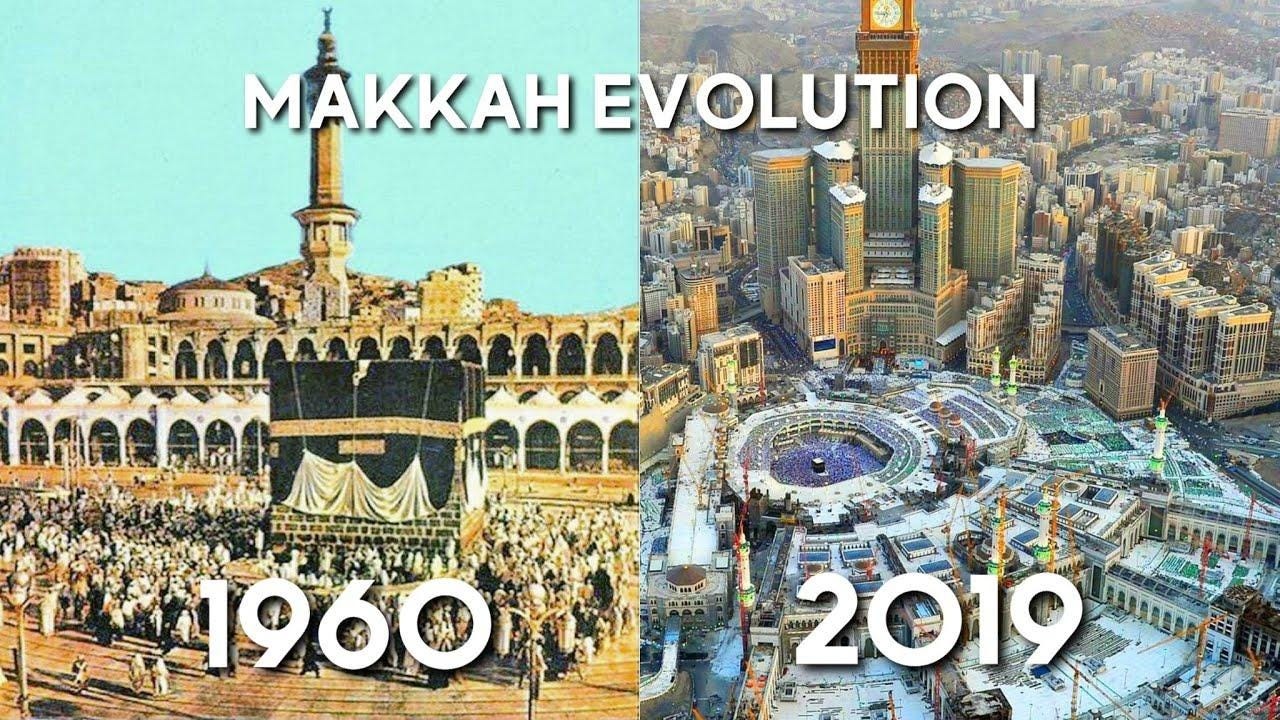
Muslims have come to compete and take pride in these structures, funded and purchased cheaply by black gold whose extraction desecrates the very sacredness of land and earth they seek to subdue. They corrupt this sanctified earth while Olive and Yaffa orange trees are uprooted in Palestine in acts that dishonor the very black, brown and red earthen clay soil from which we are all made of and that we shall eventually return to without anyone escaping this.
Our mujahideen are at war with the civilizational-tech mania that has captured the Ummah’s soul and induced sacrilegious cultural vandalism by an empowered and overpowering taghūt mentality. Our mujahideen fight against an Ummah of taghūt and excess that squanders food over lavish meals during the Holy month of Ramadān while that same Ummah’s people in Gaza are starved to death at the bidding of Crusading-Zionist genocidal conquests and normalizing appeasements.
The Ummah is the only historical-material, symbolic and spiritual manifestation of sovereignty on earth, besides Allah’s sovereignty above. The Islāmic resistance bludgeons us to confront our hypocrisies and self-conceits.
As the Qurān notes: “And why should ye not fight in the cause of Allah and of those who, being weak, are ill-treated (and oppressed) – men, women, and children, whose cry is: “Our God! Rescue us from this town, whose people are oppressors; and raise for us from the one who will protect; and raise for us from thee one who will help!” (Chapter 4, “The Women,” Verse: 75).
The mujahideen force us to face ourselves in the mirror and question what Islām really is, and what exactly it is we are practicing, especially when its social justice principles that relate to the world of the below are stripped and ring hollow. What Islām are we reverting/converting to amidst this moral decay, and the absence of Islām’s ethical-political just principles and moorings?
Our great mujahideen fight for resurgent communities rotating with the Ummah as its centrifugal center of gravity. They wage battle for an Ummah whose ranks ought to be tightly interwoven close, during prayer, in rows and as ropes tightly bound and braided together as sweetgrass.
The Ummah & Palestine Will Never Die
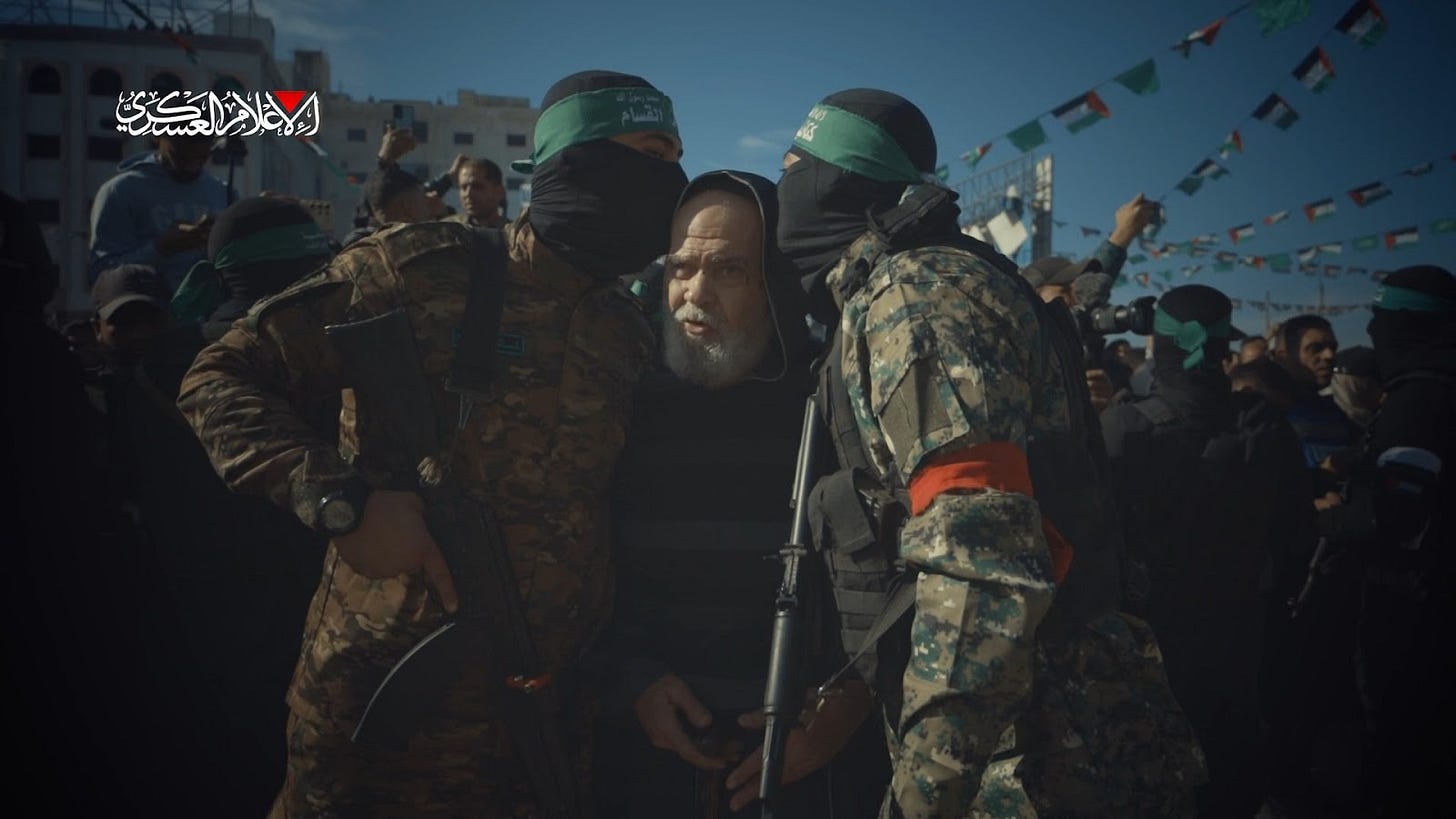
The Ummah, as an extension of Allah’s sovereignty, has adopted different characteristics in Muslim history. This includes the reign of the Rashidun, the Umayyads, the Abbasids, the Fatimids, and the Ottomans, as well as its more contemporary racialized versions embodied in problematic terms like the ‘Arab Ummah.’ As noted, there are debates over how to attain and resurrect the Ummah from its burnt ashes and who the Ummah includes.
However, one thing is certain: Because our mujahideen fight on behalf of all Palestinians and Muslims alike regardless of their spiritual denominations, creeds and in the name of all loving freedom fighters on this earth, it is undeniable that the mujahideen’s understanding of the Ummah is not one that is fascistically constrained or exclusive to Muslims. Rather, our mujahideen fight for an image of the Ummah as embodied by Prophet Muhammad’s original polity.
The Qurān of the Resistance is informed by complete freedom of choice as to whether one chooses to explicitly believe in Islām or not, when Allāh states in, at least, two verses: “Say, ‘O disbelievers’ … You have your religion and I [a Muslim] have mine” (Chapter 109, “The Unbelievers,” Verse: 6) and “Proclaim [O Muslims]: ‘This is the truth from your God’, then Whoever wills let them believe, and whoever wills let them disbelieve” (Chapter 18, “The Cave,” Verse: 29).
Decades prior to the Al-Aqsa Flood, endless discussions unfolded amongst Muslim thinkers like Fazlur Rahman and Muhammad Iqbal from Pakistan, Ali Shariati from Iran, and even more conservative militant Muslims like Abul A'la Maududi and the Egyptian Sayyid Qutb as to whether the Ummah can be brought to life through a nation-state - a master’s neocolonial tool that is inseparable from capitalism.
The muqawama’s trajectory proves that liberation through a nation-state is impossible because state-building necessitates feeding into the taghūt world of the above.
The muqawama embody an organized ‘Islām of the Below’ that affirms the Qurānic teaching that: “How many a small company has overcome a large company by permission of Allāh” (Chapter 2, “The Cow,” Verse: 249). The Qurān further emphasizes this point: “If there are twenty steadfast among you, they will defeat two hundred, and one hundred among you will defeat one thousand of those who disbelieve” (Chapter 8, “The Spoils of War,” Verse: 65).

Our mujahideen fight injustice wherever they find it, be it the taghūt within themselves or that wrought by normalizing “Islāms of the Above” and the imperial Crusading Zionist settler-colonial structures suffocating us. Against the world’s betrayals and might, our mujahideen continue to unconditionally offer without reservation a deluge of their angelic blood and chaste souls to Allah.
It is time for a collective tide to rise to our muqawama’s character, and the Prophet Muhammad’s example, in manifesting the Qurānic dictum: “Rise, for Allah does not approve of you living humiliated. Carry the banners freely and bear a heavy burden. It was not you who killed them, rather it was Allah who did. And you did not throw when you threw, but it was Allah who threw. He might test the believers with a good test.” (Chapter 8, “Spoils of War,” Verse: 17)
Palestinians in Gaza and their mujahideen are rebirthing an unadulterated Islām, that even amidst the gravest atrocities is anchored in sumud (steadfastness) and the ethos of Jihād in a time of scarce and dead valiance.
Our masked mujahideen selflessly bequeath their lives for the Ummah as a thousand blessed seeds without even the promised reaping of sowed carnations or an atom’s weight of acknowledgement in sacrifice. Allah’s sight is the only provision they seek.
The mujahideen dwell as prophets in an already liberated Palestine.
My Ummah, do you not feel shame reading the Qurān everyday? Does your heart not break when you recite Verse 75 in the Chapter of ‘The Women’ that states: “How should you not fight for the cause of Allah and of the feeble among men and of the women and the children who are crying: Our God! Bring us forth from this town of which the people are oppressors! Oh, give us from thy presence some protecting friend”?
O Allah, I beg you: Guide and strengthen our peoples, movements, our mujahideen, our prisoners, their families, and accept our martyrdom, for “Never say that those martyred in the cause of Allah are dead—in fact, they are alive! But you do not perceive it.” (Chapter 2, “The Cow,” Verse: 154).





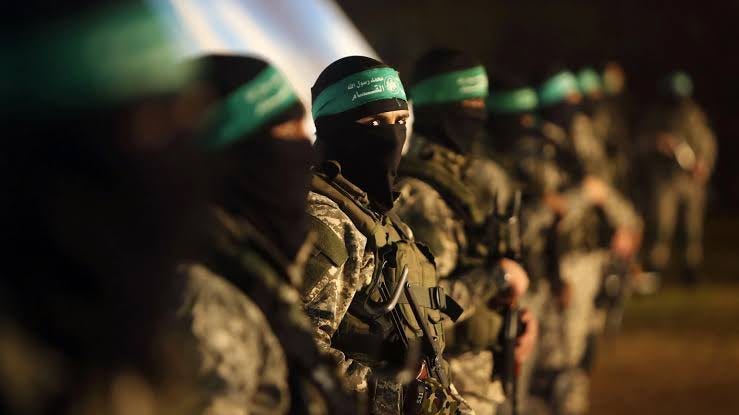


This is a stunning piece ❤️🔥
"Never say that those martyred in the cause of Allah are dead—in fact, they are alive! But you do not perceive it.” ❤️🩹❤️🔥